中考英语二轮语法专题复习:一般现在时课件(共62张PPT)
文档属性
| 名称 | 中考英语二轮语法专题复习:一般现在时课件(共62张PPT) | 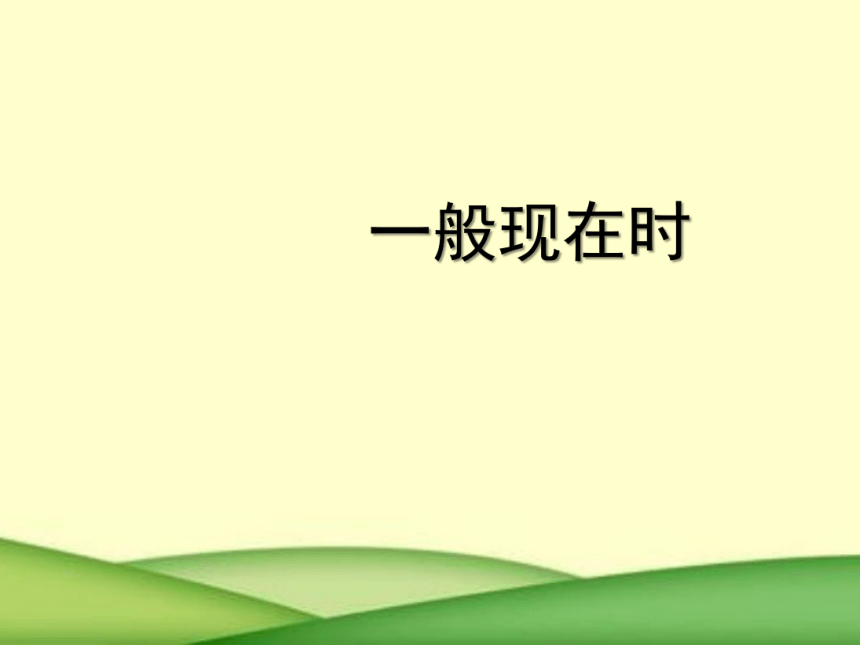 | |
| 格式 | zip | ||
| 文件大小 | 1.3MB | ||
| 资源类型 | 教案 | ||
| 版本资源 | 通用版 | ||
| 科目 | 英语 | ||
| 更新时间 | 2022-01-01 13:35:31 | ||
图片预览

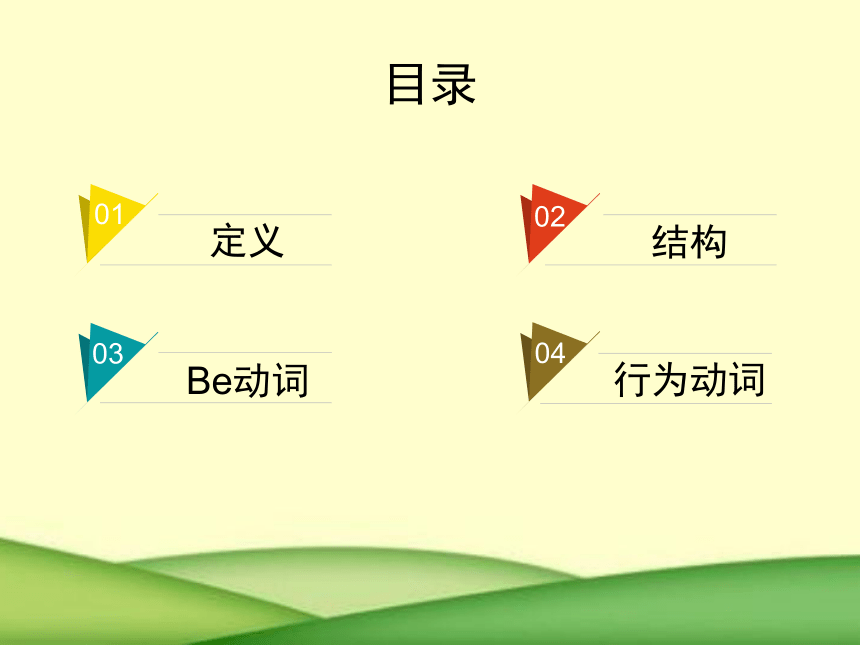
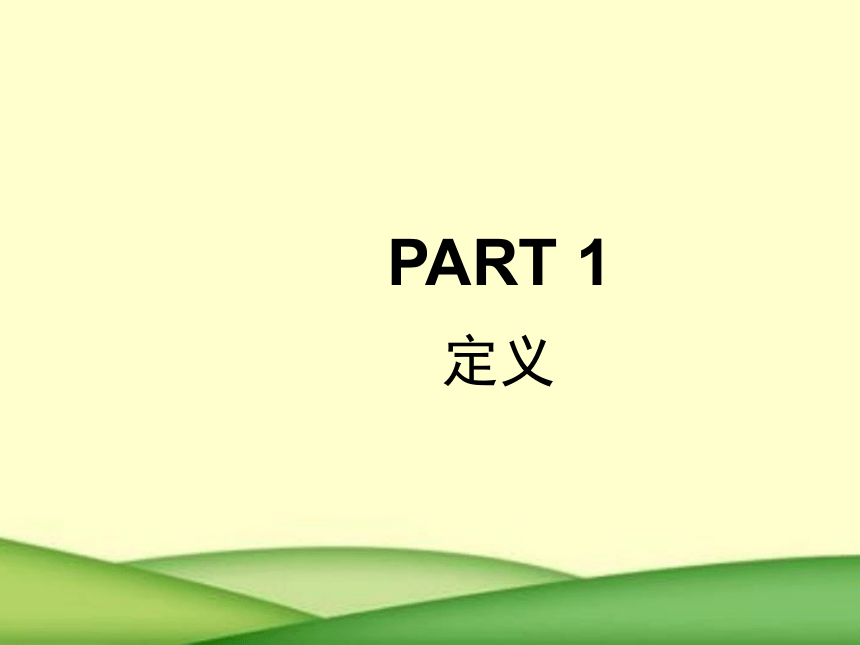
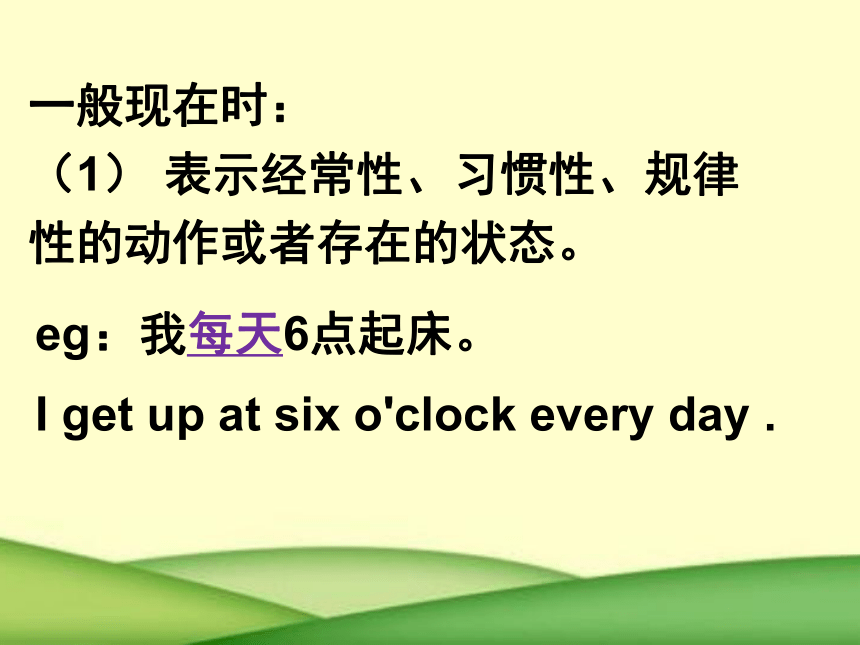
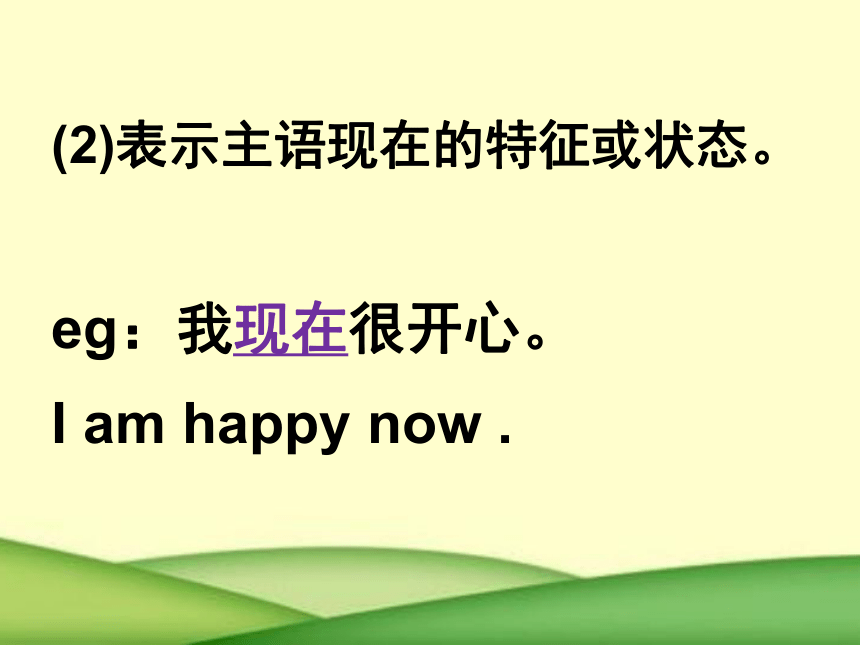
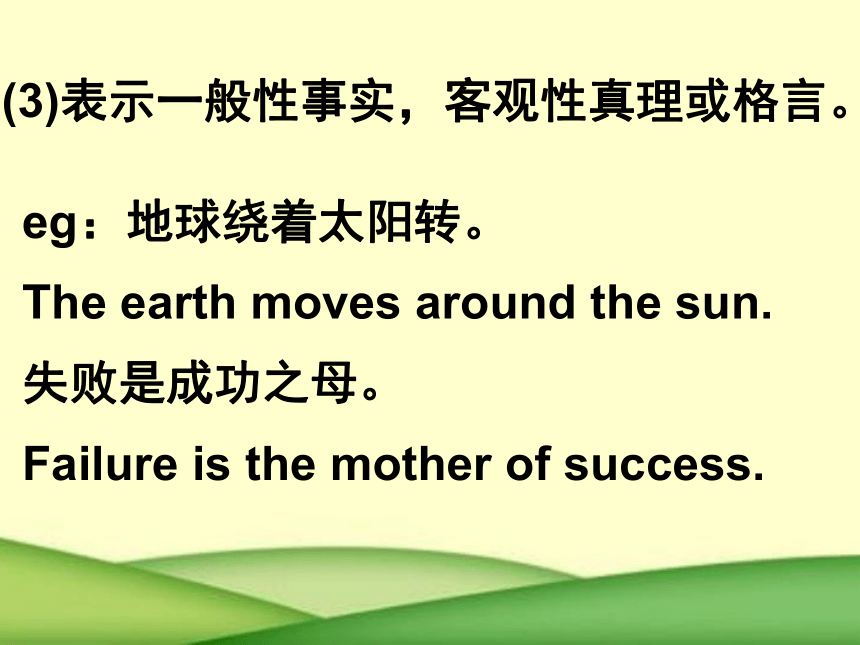
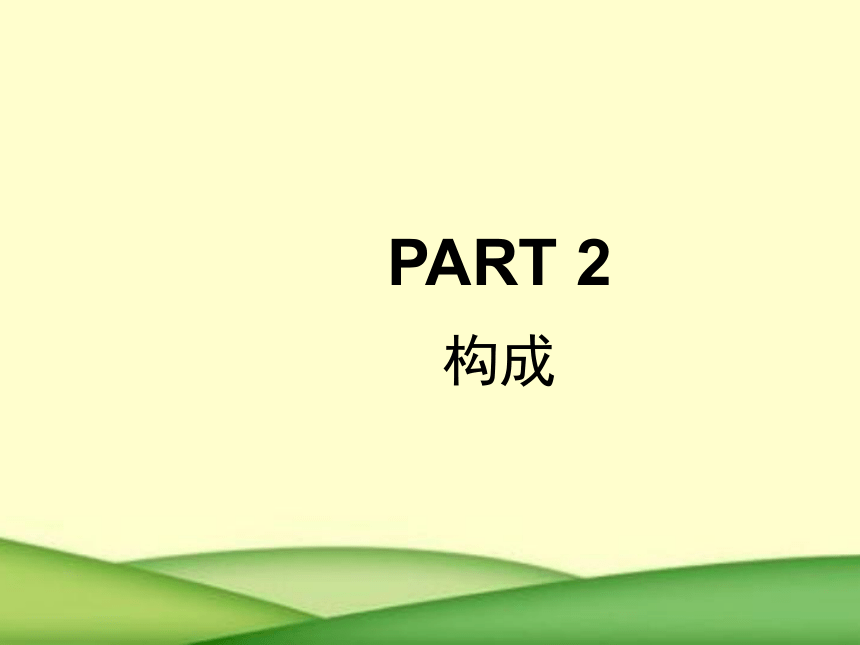
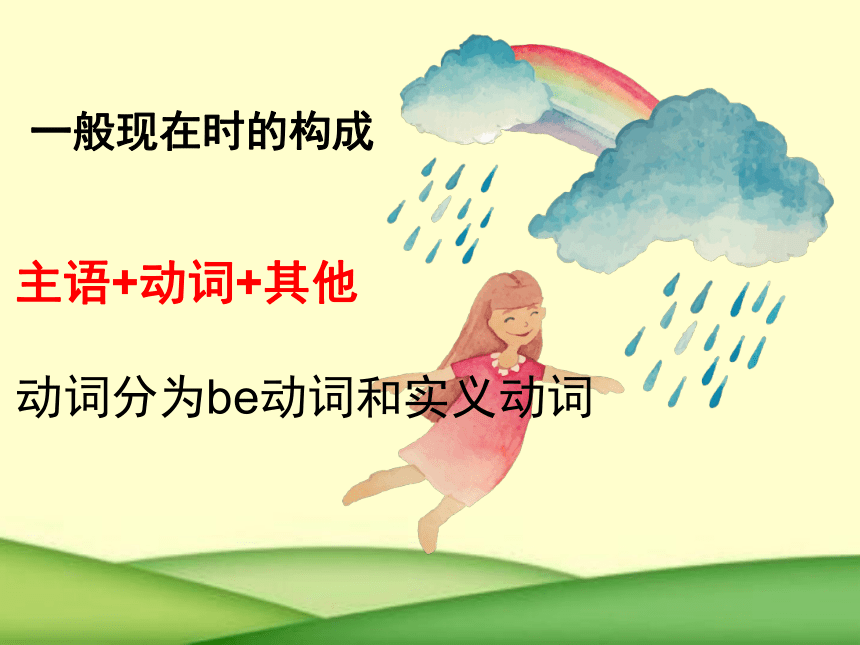
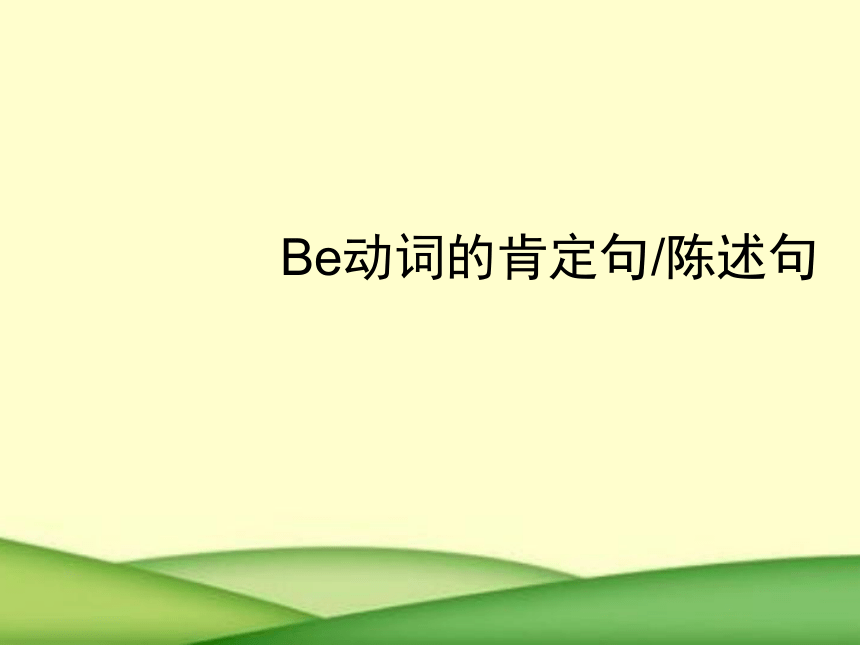
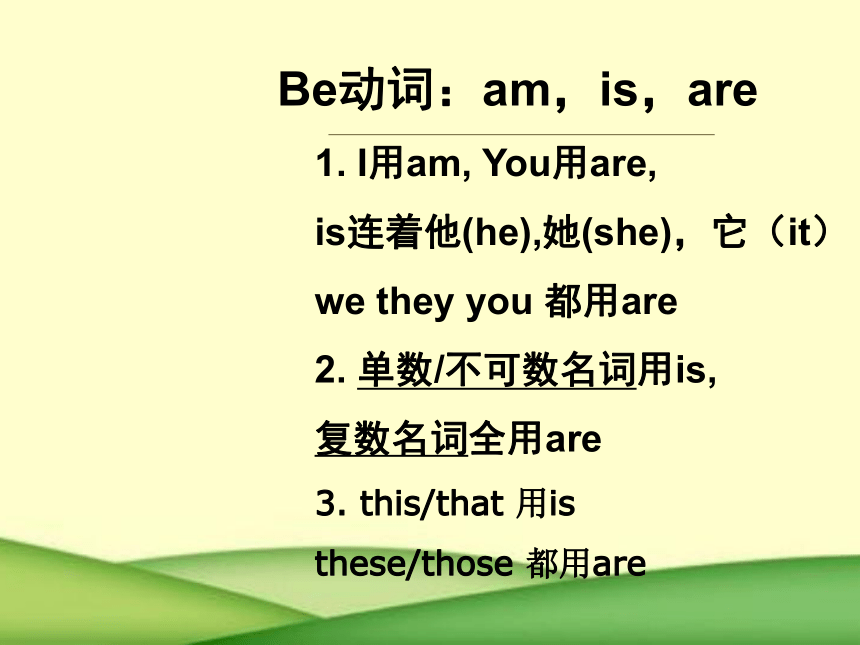
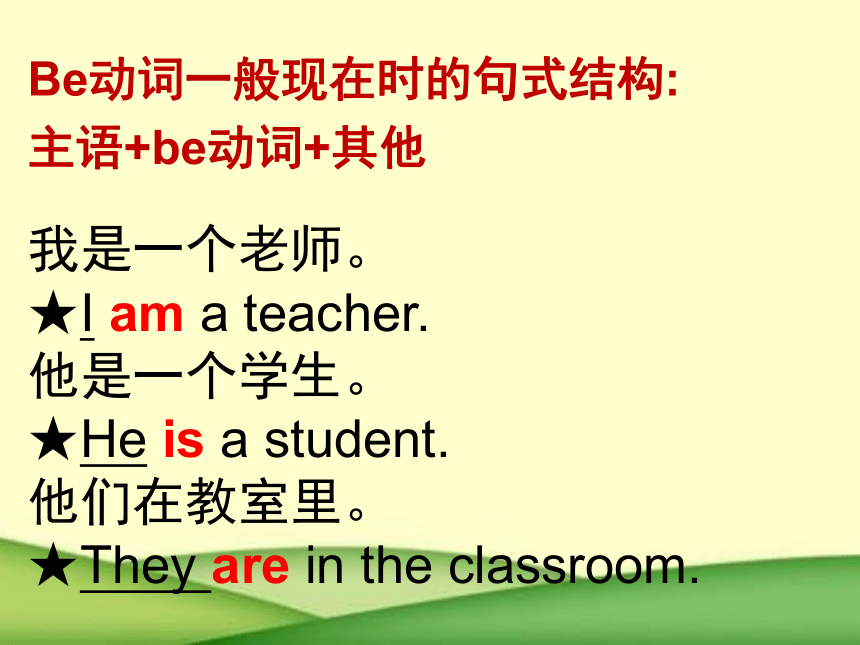
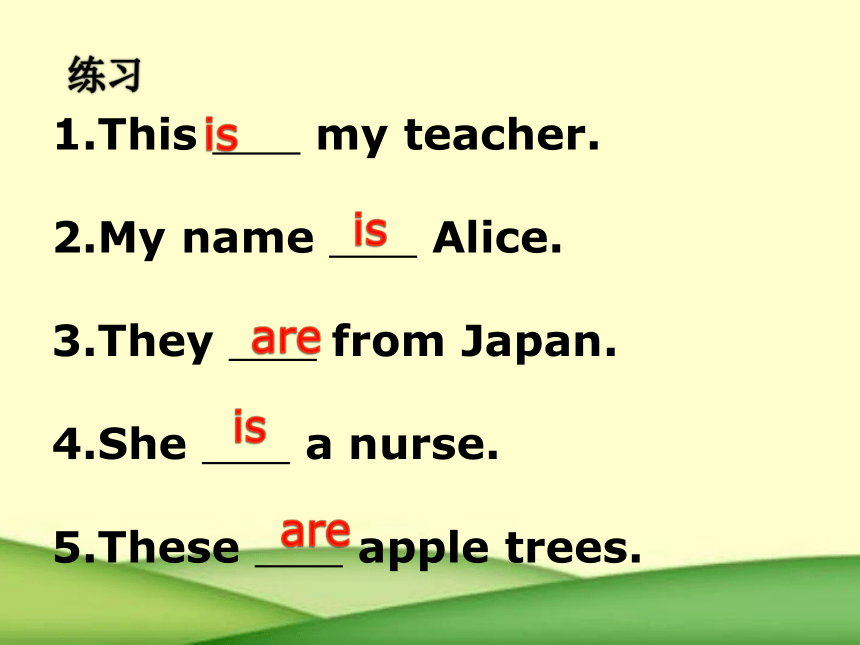
文档简介
(共62张PPT)
一般现在时
定义
结构
Be动词
行为动词
01
02
03
04
目录
定义
PART 1
一般现在时:
(1) 表示经常性、习惯性、规律性的动作或者存在的状态。
eg:我每天6点起床。
I get up at six o'clock every day .
(2)表示主语现在的特征或状态。
eg:我现在很开心。
I am happy now .
(3)表示一般性事实,客观性真理或格言。
eg:地球绕着太阳转。
The earth moves around the sun.
失败是成功之母。
Failure is the mother of success.
构成
PART 2
一般现在时的构成
主语+动词+其他
动词分为be动词和实义动词
Be动词的肯定句/陈述句
Be动词:am,is,are
1. I用am, You用are,
is连着他(he),她(she),它(it)
we they you 都用are
2. 单数/不可数名词用is,
复数名词全用are
3. this/that 用is
these/those 都用are
Be动词一般现在时的句式结构:
主语+be动词+其他
我是一个老师。
★I am a teacher.
他是一个学生。
★He is a student.
他们在教室里。
★They are in the classroom.
练习
This my teacher.
My name Alice.
They from Japan.
She a nurse.
These apple trees.
is
is
are
is
are
练习
6.Her hair black and long.
7.My name Maria.
8.Air fresh.
9.You and I good friends.
10.Ten oranges expensive.
is
is
is
are
are
be动词的否定句
一般现在时否定句:在be动词后加not
结构:主语+be动词+not+ ···
Is not =isn't
are not=aren't
★ 我(不)是一个老师。
I am a teacher.
I am not a teacher.
★ 他(不)是一个学生。
He is a student.
He is not a student.
★ 他们(不)在教室里。
They are in the classroom.
They are not in the classroom.
把下列肯定句变为否定句
1.Mary is an English girl.
.
2. His name is Tom.
.
3. Miss Chen is from Beijing.
_________________________.
Mary is not an English girl
His name is not Tom
Miss Chen is not from Beijing
4. Daming and Wang Hui are good friends.
__________________________
5. I am twenty years old.
.
6. We are from Henan.
.
Daming and Wang Hui are not good friends.
I am not twenty years old
We are not from Henan
一般现在时
be动词的一般疑问句
一般疑问句
be动词提到主语前.
Be动词+主语+ ··· ?
肯定回答: Yes, 主语+be
否定回答: No, 主语+be not
注意:
以you提问,以I/we回答
以I/we 提问,以you回答
1. 他是一位老师。(肯定句)
He is a teacher.
他是一位老师吗?(一般疑问句)
★Is he a teacher
肯定回答:Yes, he is.
否定回答:No, he isn’t.
2. 她们很快乐。(肯定句)
They are happy.
她们快乐么?(一般疑问句)
Are they happy
肯定回答:Yes, they are.
否定回答:No, they aren’t.
3. 我在教室里。(肯定句)
I am in the classroom.
你在教室里么?(一般疑问句)
Are you in the classroom
肯定回答:Yes, I am.
否定回答:No, I am not.
一般疑问句:be动词提到主语前.
Be动词+主语+ ··· ?
1.Mary is an English girl.
2. His name is Tom.
3. Miss Chen is from Beijing.
Is Mary an English girl
Is his name Tom
Is Miss Chen from Beijing
4. Daming and Wang Hui are good friends.
5. I am twenty years old.
6. We are from Henan.
Are Daming and Wang Hui good friends
Are you twenty years old
Are you from Henan
在一般疑问句中
用you提问,用I/We回答
用I/We提问,用you回答
--Where Ann
--She here.
2. --How old you
--I 13 years old.
4. --What your name
--My name Alice.
5. --What grade you in
--I in Grade Seven.
3. -- you Mike
-- No, I not
6. -- it a white cat
-- Yes, it .
7. -- these flowers beautiful
-- Yes, they .
is
is
is
is
Is
is
are
are
Are
are
Are
am
am
am
be动词的特殊疑问句
Who are you
How old is he
Where are they
特殊疑问句
你是谁?
他多大了?
他们在哪儿?
疑问词
问 谁的:whose
问 哪一个:which
问 年龄:How old
问 频率:How often
问 多远:How far
问 多长时间/多长:How long
问 什么颜色:what color/colour
特殊疑问句:
用相应的特殊疑问词提问.
特殊疑问词+be动词+主语+ ···
问 几点: what time
问 星期几: what day
问 几月几号: what date
I am twenty years old.
2. His name is Tom.
3. Miss Chen is from Beijing.
4.It is ten o’clock.
5. I am fine.
How old are you
What is his name
Where is Miss Chen from
What time is it
How are you
1. —This is my pencil.________ yours —It’s in my pencil box.A. What color B. What aboutC. What is D. What are2.—______ the woman —She is my new teacher.A.What’s B.Who’sC.Whose D.Whom3. —____is my dictionary I can’t find it.—Oh, it’s in your bedroom.A. Why B. WhenC. What D. Where
4.—Tom, ____ bag is it —It’s Lily’s.A. where B. whatC. whose D. how
8.—____ do you prefer, coffee or tea —Tea, please.A. What B. WhoC. Which D. How
9. is your T-shirt
It’s blue.
A. What color B. How
5.—______ is it now —It’s seven to eight.A. What time B. What dayC. What date D. Which6.—_____ is it today —It’s Friday.A. What time B. What dayC. What date D. What’s7.—_____is it — March 7th.A. What time B. What dateC. What day D. What color
行为/实义动词
PART 2
行为/实义动词的一般现在时
1、什么叫实义动词?
实义/行为动词是指有具体意思的动词
如: like(喜欢), eat(吃), live(居住), have(有), run(跑) 等。
实义动词占英语中动词的绝大多数。
be 动词可译成“是”,可译成“成为”,有时没有具体意思。
eg:She is tall. →译文:她很高。
be 动词不属于实义动词,它有自己的名称,叫做系动词。
2、一般现在时 实义动词作谓语时的两种形式:
动词原形;如: study
I study English.
动词单三形式;如: studies
He studies English.
动词的单三形式
一般情况 动词词尾加s get → gets
work→ works
read →reads
辅音字母加y结尾的单词 (元音字母 A E I O U) 变y为i,再加es (以元音字母加y结尾的单词,直接在词尾加s) fly → flies
study → studies
(say → says)
以s, x, sh, ch, o 结尾的单词 在动词词尾加es pass → passes
fix → fixes
wash → washes
watch → watches
go → goes
do → does
不规则的变化 have → has
实义动词单三变化--练习
play
studies
get
gets
brush
brushes
like
teach
likes
teaches
fly
flies
guess
do
study
close
carry
have
guesses
does
plays
closes
carries
has
1. say
2. swim
3. work
4. catch
5. go
6. worry
7. guess
8. stay
9. finish
10. buy
11. match
says
swims
works
catches
goes
worries
guesses
stays
finishes
buys
matches
enjoys
loves
dislikes
12.enjoy
13.love
14.dislike
主语(I/We/You/They/可数名词复数)+动词原形+其他
如:I stay at home.
我待在家里。
主语(He/She/It/可数名词单数/不可数名词)+动词单三形式+其他
如:He stays at home.
他待在家里。
4、实义动词的一般现在时的肯定句
1. I often (go) to school at seven in the morning.
2. Mike (do) his homework at nine in the evening.
3. His father often (read) books in the library.
4. My mother usually (watch) TV at home.
5. They (go) to school by bus.
go
does
reads
watches
go
6. She (go) to school by bus.
7. Mike and Tom (fly) kites twice a week.
8. My cousin sometimes (play) cards with me.
9. Lily usually (listen) to the radio in the morning.
10. Mr. Smith (have) 3 bikes.
goes
fly
plays
listens
has
1. She ______ down and soon falls asleep.
A. live B. lain C. laid D. sits
2. They _____ the office on time every morning.
A. reached B. arrived
C. go to D. goes to
3. Our teacher ______ us to be kind.
A. ask B. asking C. asks D. asked
4. She and I _______(take) a walk together every evening.
5. Su Hai and Su Yang ______(have) eight lessons this term.
6. Su Hai (have) eight lessons this term.
take
have
has
6. Water ______ cold to people.
A. brings B. bring C. to bring
7. The child often TV at night.
A. watchs B. watches C. watch
7. Those children often TV alone.
A. watchs B. watches C. watch
2) 否定句:
主语(I/We/You/They/可数名词复数)+ don’t +动词原形+其他
如:I do not stay at home.
主语(He/She/It/可数名词单数/不可数名词)+ doesn’t +动词原形+其他
如:He doesn’t stay at home.
1.I watch TV every day.
____________________________
2.They live in a small town. ____________________________
3.David has a goal.
____________________________
4.My dog runs fast. __________________________
I don’t watch TV every day.
They don’t live in a small town.
David doesn’t have a goal.
My dog doesn’t run fast.
否定句:
1. He (have) a dog.
2. We (like) that little girl.
3. They (sing) well.
4. She (enjoys) playing soccer.
5. Lily (loved) going shopping.
6. I (goes) to school on foot.
doesn't have
don't like
don't sing
don't go
doesn't enjoy
doesn't love
Lily run fast.
A. don’t B. doesn’t C. isn’t
I like eating vegetables.
A. don’t B. doesn’t C. am not
The child doesnt’ football.
A. play B. plays C. played
Those children don’t soccor.
A. play B. plays C. played
3) 一般疑问句及其肯、否定回答:
Do+主语(I/we/you/they/可数名词复数)+动词原形+其他?
肯定回答:Yes, sb do
否定回答: No, sb don’t.
注意:以you提问,以I/we 回答
以I/we提问,用you回答
如:Do you stay at home everyday
--Yes,I do.
-- No,I don’t.
Does+主语(he/she/it/可数名词单数/不可数名词)+动词原形+其他?
肯定回答:Yes, sb does.
否定回答:No, sb doesn’t.
如:Does he stay at home everyday
--Yes,he does.
-- No,he doesn’t.
1. _____you _____(brush) your teeth every morning?
.(肯定回答)
.(否定回答)
2. __ __ Mike__ __(read) English every day
.(肯定回答)
.(否定回答)
Do
brush
Yes, I do
No, I don’t
Does
read
Yes, he does
No, he doesn’t
1. -- you want to buy some new clothes
-- Yes, .
A Do; I do B. Does; I don't
C. Can; I do
2. -- she running
-- No, she doesn't
A. Do; like B. Does; like
C. Does, likes
3. -- Do you with me
-- Yes, do.
A. agree; you B. agrees; I
C. agree; I
A
B
C
4. -- your sister to go the cinema
-- I don't know.
A. Does; wants B. Do; want C. Does; want
5. -- What kinds of sports Jack like
-- He soccer.
A. does; like B. does; likes
C. is; likes
6. -- they know Lily go to school by bus
A. Do; don't B. Do; doesn't
C. Are; doesn't
C
B
B
4) 特殊疑问句:
疑问词+ do +主语(I/we/they/you/可数名词复数) +动词原形+其他?
如:
-- When do you get up every morning? 你每天早上什么时候起床?
-- I get up at seven o’clock.
我7点起床。
特殊疑问句
回答时直接回答,不用yes 或no.
4) 特殊疑问句:
疑问词+ does +主语(he/she/it/单数可数名词/不可数名词) +动词原形+其他?
如:
-- When does Lily get up every morning?莉莉每天早上什么时候起床?
-- She gets up at seven o’clock.
她7点起床
1. -- What you
-- I want your books.
A. do; want B. are; want
C. does; want
2. -- Where Tom to go
-- He plans to go Hubei.
A. does; plan B. is; plans
C. does; plans
3. -- does Tom go to school
-- He often to school by bus.
A. When; goes B. How; goes
C. How; go
A
A
B
4. -- do they lunch
-- They often have lunch at school.
A. When; have B. Where; have
C. What; has
5. -- Tom get up everyday
-- He often gets up at six.
A. When does B. When do
C. Where does
6. -- What your mother
-- She is a teacher.
A. do; does B. does; does
C. does; do
B
A
c
总结
一、含有BE动词或情态动词
变否定:BE动词后+not
变疑问:BE提到主语前
二、含有实义动词
变否定:
1.先找一个助动词do或does
2.助动词后+not
3.原句动词还原
变疑问:
1.先找一个助动词do或does
2.助动词提到主语前
3.原句动词还原
Homework
初一教材找出来,挑选一般现在时的习题,重新做一做
感谢您的观看
一般现在时
定义
结构
Be动词
行为动词
01
02
03
04
目录
定义
PART 1
一般现在时:
(1) 表示经常性、习惯性、规律性的动作或者存在的状态。
eg:我每天6点起床。
I get up at six o'clock every day .
(2)表示主语现在的特征或状态。
eg:我现在很开心。
I am happy now .
(3)表示一般性事实,客观性真理或格言。
eg:地球绕着太阳转。
The earth moves around the sun.
失败是成功之母。
Failure is the mother of success.
构成
PART 2
一般现在时的构成
主语+动词+其他
动词分为be动词和实义动词
Be动词的肯定句/陈述句
Be动词:am,is,are
1. I用am, You用are,
is连着他(he),她(she),它(it)
we they you 都用are
2. 单数/不可数名词用is,
复数名词全用are
3. this/that 用is
these/those 都用are
Be动词一般现在时的句式结构:
主语+be动词+其他
我是一个老师。
★I am a teacher.
他是一个学生。
★He is a student.
他们在教室里。
★They are in the classroom.
练习
This my teacher.
My name Alice.
They from Japan.
She a nurse.
These apple trees.
is
is
are
is
are
练习
6.Her hair black and long.
7.My name Maria.
8.Air fresh.
9.You and I good friends.
10.Ten oranges expensive.
is
is
is
are
are
be动词的否定句
一般现在时否定句:在be动词后加not
结构:主语+be动词+not+ ···
Is not =isn't
are not=aren't
★ 我(不)是一个老师。
I am a teacher.
I am not a teacher.
★ 他(不)是一个学生。
He is a student.
He is not a student.
★ 他们(不)在教室里。
They are in the classroom.
They are not in the classroom.
把下列肯定句变为否定句
1.Mary is an English girl.
.
2. His name is Tom.
.
3. Miss Chen is from Beijing.
_________________________.
Mary is not an English girl
His name is not Tom
Miss Chen is not from Beijing
4. Daming and Wang Hui are good friends.
__________________________
5. I am twenty years old.
.
6. We are from Henan.
.
Daming and Wang Hui are not good friends.
I am not twenty years old
We are not from Henan
一般现在时
be动词的一般疑问句
一般疑问句
be动词提到主语前.
Be动词+主语+ ··· ?
肯定回答: Yes, 主语+be
否定回答: No, 主语+be not
注意:
以you提问,以I/we回答
以I/we 提问,以you回答
1. 他是一位老师。(肯定句)
He is a teacher.
他是一位老师吗?(一般疑问句)
★Is he a teacher
肯定回答:Yes, he is.
否定回答:No, he isn’t.
2. 她们很快乐。(肯定句)
They are happy.
她们快乐么?(一般疑问句)
Are they happy
肯定回答:Yes, they are.
否定回答:No, they aren’t.
3. 我在教室里。(肯定句)
I am in the classroom.
你在教室里么?(一般疑问句)
Are you in the classroom
肯定回答:Yes, I am.
否定回答:No, I am not.
一般疑问句:be动词提到主语前.
Be动词+主语+ ··· ?
1.Mary is an English girl.
2. His name is Tom.
3. Miss Chen is from Beijing.
Is Mary an English girl
Is his name Tom
Is Miss Chen from Beijing
4. Daming and Wang Hui are good friends.
5. I am twenty years old.
6. We are from Henan.
Are Daming and Wang Hui good friends
Are you twenty years old
Are you from Henan
在一般疑问句中
用you提问,用I/We回答
用I/We提问,用you回答
--Where Ann
--She here.
2. --How old you
--I 13 years old.
4. --What your name
--My name Alice.
5. --What grade you in
--I in Grade Seven.
3. -- you Mike
-- No, I not
6. -- it a white cat
-- Yes, it .
7. -- these flowers beautiful
-- Yes, they .
is
is
is
is
Is
is
are
are
Are
are
Are
am
am
am
be动词的特殊疑问句
Who are you
How old is he
Where are they
特殊疑问句
你是谁?
他多大了?
他们在哪儿?
疑问词
问 谁的:whose
问 哪一个:which
问 年龄:How old
问 频率:How often
问 多远:How far
问 多长时间/多长:How long
问 什么颜色:what color/colour
特殊疑问句:
用相应的特殊疑问词提问.
特殊疑问词+be动词+主语+ ···
问 几点: what time
问 星期几: what day
问 几月几号: what date
I am twenty years old.
2. His name is Tom.
3. Miss Chen is from Beijing.
4.It is ten o’clock.
5. I am fine.
How old are you
What is his name
Where is Miss Chen from
What time is it
How are you
1. —This is my pencil.________ yours —It’s in my pencil box.A. What color B. What aboutC. What is D. What are2.—______ the woman —She is my new teacher.A.What’s B.Who’sC.Whose D.Whom3. —____is my dictionary I can’t find it.—Oh, it’s in your bedroom.A. Why B. WhenC. What D. Where
4.—Tom, ____ bag is it —It’s Lily’s.A. where B. whatC. whose D. how
8.—____ do you prefer, coffee or tea —Tea, please.A. What B. WhoC. Which D. How
9. is your T-shirt
It’s blue.
A. What color B. How
5.—______ is it now —It’s seven to eight.A. What time B. What dayC. What date D. Which6.—_____ is it today —It’s Friday.A. What time B. What dayC. What date D. What’s7.—_____is it — March 7th.A. What time B. What dateC. What day D. What color
行为/实义动词
PART 2
行为/实义动词的一般现在时
1、什么叫实义动词?
实义/行为动词是指有具体意思的动词
如: like(喜欢), eat(吃), live(居住), have(有), run(跑) 等。
实义动词占英语中动词的绝大多数。
be 动词可译成“是”,可译成“成为”,有时没有具体意思。
eg:She is tall. →译文:她很高。
be 动词不属于实义动词,它有自己的名称,叫做系动词。
2、一般现在时 实义动词作谓语时的两种形式:
动词原形;如: study
I study English.
动词单三形式;如: studies
He studies English.
动词的单三形式
一般情况 动词词尾加s get → gets
work→ works
read →reads
辅音字母加y结尾的单词 (元音字母 A E I O U) 变y为i,再加es (以元音字母加y结尾的单词,直接在词尾加s) fly → flies
study → studies
(say → says)
以s, x, sh, ch, o 结尾的单词 在动词词尾加es pass → passes
fix → fixes
wash → washes
watch → watches
go → goes
do → does
不规则的变化 have → has
实义动词单三变化--练习
play
studies
get
gets
brush
brushes
like
teach
likes
teaches
fly
flies
guess
do
study
close
carry
have
guesses
does
plays
closes
carries
has
1. say
2. swim
3. work
4. catch
5. go
6. worry
7. guess
8. stay
9. finish
10. buy
11. match
says
swims
works
catches
goes
worries
guesses
stays
finishes
buys
matches
enjoys
loves
dislikes
12.enjoy
13.love
14.dislike
主语(I/We/You/They/可数名词复数)+动词原形+其他
如:I stay at home.
我待在家里。
主语(He/She/It/可数名词单数/不可数名词)+动词单三形式+其他
如:He stays at home.
他待在家里。
4、实义动词的一般现在时的肯定句
1. I often (go) to school at seven in the morning.
2. Mike (do) his homework at nine in the evening.
3. His father often (read) books in the library.
4. My mother usually (watch) TV at home.
5. They (go) to school by bus.
go
does
reads
watches
go
6. She (go) to school by bus.
7. Mike and Tom (fly) kites twice a week.
8. My cousin sometimes (play) cards with me.
9. Lily usually (listen) to the radio in the morning.
10. Mr. Smith (have) 3 bikes.
goes
fly
plays
listens
has
1. She ______ down and soon falls asleep.
A. live B. lain C. laid D. sits
2. They _____ the office on time every morning.
A. reached B. arrived
C. go to D. goes to
3. Our teacher ______ us to be kind.
A. ask B. asking C. asks D. asked
4. She and I _______(take) a walk together every evening.
5. Su Hai and Su Yang ______(have) eight lessons this term.
6. Su Hai (have) eight lessons this term.
take
have
has
6. Water ______ cold to people.
A. brings B. bring C. to bring
7. The child often TV at night.
A. watchs B. watches C. watch
7. Those children often TV alone.
A. watchs B. watches C. watch
2) 否定句:
主语(I/We/You/They/可数名词复数)+ don’t +动词原形+其他
如:I do not stay at home.
主语(He/She/It/可数名词单数/不可数名词)+ doesn’t +动词原形+其他
如:He doesn’t stay at home.
1.I watch TV every day.
____________________________
2.They live in a small town. ____________________________
3.David has a goal.
____________________________
4.My dog runs fast. __________________________
I don’t watch TV every day.
They don’t live in a small town.
David doesn’t have a goal.
My dog doesn’t run fast.
否定句:
1. He (have) a dog.
2. We (like) that little girl.
3. They (sing) well.
4. She (enjoys) playing soccer.
5. Lily (loved) going shopping.
6. I (goes) to school on foot.
doesn't have
don't like
don't sing
don't go
doesn't enjoy
doesn't love
Lily run fast.
A. don’t B. doesn’t C. isn’t
I like eating vegetables.
A. don’t B. doesn’t C. am not
The child doesnt’ football.
A. play B. plays C. played
Those children don’t soccor.
A. play B. plays C. played
3) 一般疑问句及其肯、否定回答:
Do+主语(I/we/you/they/可数名词复数)+动词原形+其他?
肯定回答:Yes, sb do
否定回答: No, sb don’t.
注意:以you提问,以I/we 回答
以I/we提问,用you回答
如:Do you stay at home everyday
--Yes,I do.
-- No,I don’t.
Does+主语(he/she/it/可数名词单数/不可数名词)+动词原形+其他?
肯定回答:Yes, sb does.
否定回答:No, sb doesn’t.
如:Does he stay at home everyday
--Yes,he does.
-- No,he doesn’t.
1. _____you _____(brush) your teeth every morning?
.(肯定回答)
.(否定回答)
2. __ __ Mike__ __(read) English every day
.(肯定回答)
.(否定回答)
Do
brush
Yes, I do
No, I don’t
Does
read
Yes, he does
No, he doesn’t
1. -- you want to buy some new clothes
-- Yes, .
A Do; I do B. Does; I don't
C. Can; I do
2. -- she running
-- No, she doesn't
A. Do; like B. Does; like
C. Does, likes
3. -- Do you with me
-- Yes, do.
A. agree; you B. agrees; I
C. agree; I
A
B
C
4. -- your sister to go the cinema
-- I don't know.
A. Does; wants B. Do; want C. Does; want
5. -- What kinds of sports Jack like
-- He soccer.
A. does; like B. does; likes
C. is; likes
6. -- they know Lily go to school by bus
A. Do; don't B. Do; doesn't
C. Are; doesn't
C
B
B
4) 特殊疑问句:
疑问词+ do +主语(I/we/they/you/可数名词复数) +动词原形+其他?
如:
-- When do you get up every morning? 你每天早上什么时候起床?
-- I get up at seven o’clock.
我7点起床。
特殊疑问句
回答时直接回答,不用yes 或no.
4) 特殊疑问句:
疑问词+ does +主语(he/she/it/单数可数名词/不可数名词) +动词原形+其他?
如:
-- When does Lily get up every morning?莉莉每天早上什么时候起床?
-- She gets up at seven o’clock.
她7点起床
1. -- What you
-- I want your books.
A. do; want B. are; want
C. does; want
2. -- Where Tom to go
-- He plans to go Hubei.
A. does; plan B. is; plans
C. does; plans
3. -- does Tom go to school
-- He often to school by bus.
A. When; goes B. How; goes
C. How; go
A
A
B
4. -- do they lunch
-- They often have lunch at school.
A. When; have B. Where; have
C. What; has
5. -- Tom get up everyday
-- He often gets up at six.
A. When does B. When do
C. Where does
6. -- What your mother
-- She is a teacher.
A. do; does B. does; does
C. does; do
B
A
c
总结
一、含有BE动词或情态动词
变否定:BE动词后+not
变疑问:BE提到主语前
二、含有实义动词
变否定:
1.先找一个助动词do或does
2.助动词后+not
3.原句动词还原
变疑问:
1.先找一个助动词do或does
2.助动词提到主语前
3.原句动词还原
Homework
初一教材找出来,挑选一般现在时的习题,重新做一做
感谢您的观看
同课章节目录
- 词法
- 名词
- 动词和动词短语
- 动词语态
- 动词时态
- 助动词和情态动词
- 非谓语动词
- 冠词
- 代词
- 数词和量词
- 形容词副词及其比较等级
- 介词和介词短语
- 连词和感叹词
- 构词法
- 相似、相近词比较
- 句法
- 陈述句
- 一般疑问句和否定疑问句
- 特殊疑问句及选择疑问句
- 反意疑问句
- 存在句(There be句型)
- 宾语从句
- 定语从句
- 状语从句
- 主谓一致问题
- 简单句
- 并列句
- 复合句
- 主谓一致
- 主、表语从句
- 名词性从句
- 直接引语和间接引语
- 虚拟语气
- 感叹句
- 强调句
- 倒装句
- 祈使句
- 句子的成分
- 句子的分类
- 题型专区
- 单项选择部分
- 易错题
- 完形填空
- 阅读理解
- 词汇练习
- 听说训练
- 句型转换
- 补全对话
- 短文改错
- 翻译
- 书面表达
- 任务型阅读
- 语法填空
- 其他资料
